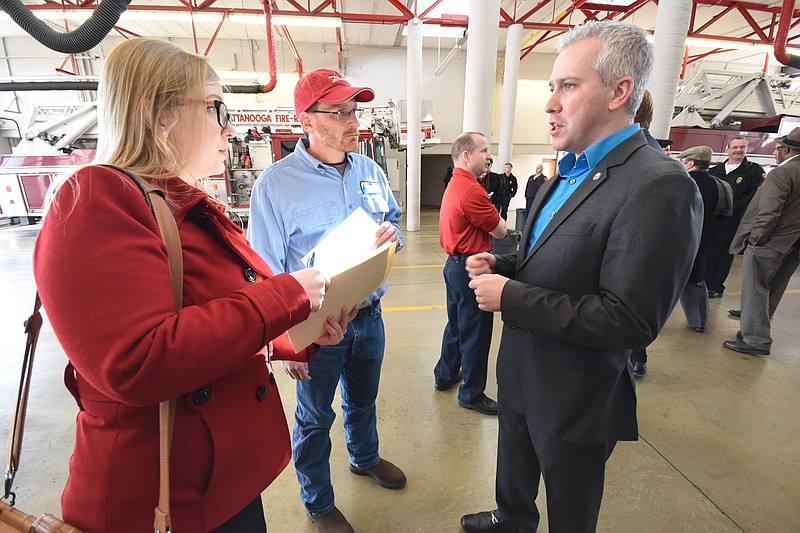Some Chattanooga officials say a Memphis-area state senator's efforts to dissolve union agreements with city workers amounts to an attack on municipal employees statewide.
At a news conference Thursday, City Councilman Chris Anderson introduced a proposed resolution asking his fellow council members to formally denounce state Senate Bill 123, drafted by Sen. Brian Kelsey, R-Germantown. Anderson says that, among other things, the legislation could negatively affect up to 3,000 workers in Chattanooga alone.
The Senate bill seeks to prevent cities and metropolitan governments in Tennessee from recognizing or entering agreements with employee unions and rendering any "agreement, contract, understanding, or practice, written or oral, implied or expressed" between a city and a union "illegal, void and of no legal effect."
Kelsey said Thursday he is only trying to help cities.
"If Tennessee wants to truly be a right-to-work state, we are going to have to apply those principles all the way down to the local level," Kelsey said. "This bill will help cities to control their budget issues by giving them the ability to negotiate directly with employees."
The House companion bill was introduced Wednesday by Rep. Jeremy Durham, R-Franklin.
Anderson says Kelsey is trying to tell Chattanooga -- and all cities in the state -- how to operate.
"Someone who, as far as I know, has never set foot in Chattanooga believes he knows better than we do how to take care of Chattanooga business," Anderson said.
The city has agreements with several unions representing its firefighters, police, service employees and electrical workers.
Anderson said that without union agreements, the city could not have reformed the Fire & Police Pension Fund or pay plans without expensive litigation, or have built its smart grid or the fabled Gig Internet infrastructure.
Council members Jerry Mitchell and Moses Freeman stood with Anderson and union leaders Thursday, and Anderson said Councilman Russell Gilbert also supports the resolution.
Councilman Ken Smith stood by in the crowd.
Union politics aside, Smith said Kelsey's bill was an overreach of state government.
"I'm in favor of local municipalities having the authority to decide how they work with their employees," Smith said.
Kelsey's bill has been introduced and referred to the state Senate Commerce and Labor Committee.
Sen. Bo Watson, who sits on that committee, said Thursday he had only been briefed on the bill, but he said it only codifies case law that's already been settled in the state Supreme Court. Kelsey's bill cites Fulenwider v. Firefighters Association, a 1982 case that he says defined contracts between cities and unions as unenforceable.
"If Councilman Smith thinks it's an overreach, he needs to have that discussion with the Tennessee Supreme Court," Watson said.
However, Watson said he had not fully reviewed the text and his mind could change.
"I'm sure there will be more discussion on it. Obviously, over time things can change. I'm being consistent with the state's position on public employees."
Sen. Todd Gardenhire, R-Chattanooga, also sits on the labor committee. He said Thursday he had not yet seen Kelsey's legislation and could not comment on it.
Tennessee Republicans successfully ended collective bargaining for teachers in 2011, stripping power from the Tennessee Education Association and the Professional Educators of Tennessee. Teachers now have a different process called collaborative conferencing. But state workers still have their own union, the Tennessee State Employees Association.
And top GOP politicians railed against the United Auto Workers ahead of a union authorization vote at Chattanooga's Volkswagen plant in February 2014. The UAW lost that election but has since gone on to win representation of part of VW's Chattanooga work force.
Local union leaders support Anderson's effort and hope the City Council and the Legislature will oppose the labor bill.
Jack Thompson, president of the Chattanooga Fire Fighters Association Local No. 820, said passage of the bill would hinder the department in every way.
"What it does is it impacts our ability to work with the city to get ahead of issues and work together," Thompson said.
The bill would even prevent the firefighters union from making agreements with the city to hold "pass the boot" fundraisers and other charitable activities, he said.
Kelsey said if there were "unintended consequences" such as prohibiting charitable activities they will be amended out of the bill after committee.
Michael Newton, president of of the local International Brotherhood of Police Officers No. 673, said the city's police must have a representative to speak for their rights.
"We went for years without any of our guys getting a raise under past administrations," Newton said. "To me, this bill is anti-working person and anti-employee."
Contact staff writer Louie Brogdon at lbrogdon@timesfreepress.com, @glbrogdoniv on Twitter or at 423-757-6481.

